Campus/People
-
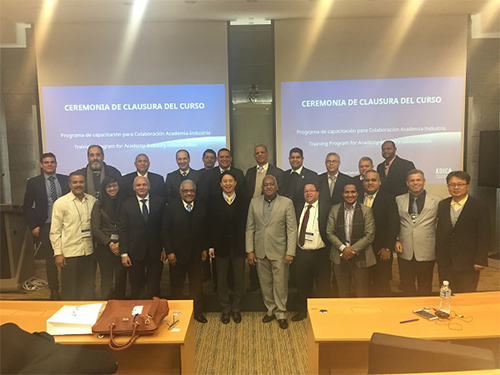 Center for Overseas Development Hosts Dominican Republic Officials
The Center for Overseas Development at KAIST invited a group of government and higher education officials from the Dominican Republic and offered them an opportunity to learn about KAIST and other public institutions in Korea.
The Dominican delegation, consisting of 20 high-ranking officials from the Ministry of Higher Education, Science and Technology (MESCYT), the Autonomous University of Santo Domingo (UASD), the Pontifical Catholic University (PUCMM), and Santiago University of Technology (UTESA), stayed in Korea for about two weeks, December 4-17, 2016 and visited KAIST, the Korea International Cooperation Agency (KOICA), universities, research centers, and companies. They also participated in meetings, workshops, and lectures to deepen their understanding of Korea.
The purpose of the Dominican delegation’s visit was to learn about Korea’s knowledge and experiences acquired over the years from establishing and operating what many view now as some of the leading universities, research organizations, and industries in the world.
lácido F. Gomez Ramirez, Deputy Minister of MESCYT, said that their visit would be a good reference when formulating action plans for the growth of science and technology in the Dominican Republic.
He added, “We were able to see how Korea has transformed itself into a high-tech nation. We will share Korea’s success stories with our people in the Dominican Republic, for example, referring to them when creating a system to facilitate cooperation among the government, higher education, and industry. I hope our second visit, slated for some time next year, will allow us to discuss cooperation between the two countries in more concrete terms including opening branch offices of Korean companies in our country.”
Sung-Hyon Myaeng, Director of KAIST’s Center for Overseas Development, said, “We will continue our support to coordinate more visits by the Dominican Republic and expand cooperation, particularly, in higher education.”
The visit was arranged with support from KOICA to offer Dominican senior professionals from higher education and government offices a chance to increase their competency, to promote research activities in science and technology, and to accelerate industry and university collaboration.
2016.12.22 View 6291
Center for Overseas Development Hosts Dominican Republic Officials
The Center for Overseas Development at KAIST invited a group of government and higher education officials from the Dominican Republic and offered them an opportunity to learn about KAIST and other public institutions in Korea.
The Dominican delegation, consisting of 20 high-ranking officials from the Ministry of Higher Education, Science and Technology (MESCYT), the Autonomous University of Santo Domingo (UASD), the Pontifical Catholic University (PUCMM), and Santiago University of Technology (UTESA), stayed in Korea for about two weeks, December 4-17, 2016 and visited KAIST, the Korea International Cooperation Agency (KOICA), universities, research centers, and companies. They also participated in meetings, workshops, and lectures to deepen their understanding of Korea.
The purpose of the Dominican delegation’s visit was to learn about Korea’s knowledge and experiences acquired over the years from establishing and operating what many view now as some of the leading universities, research organizations, and industries in the world.
lácido F. Gomez Ramirez, Deputy Minister of MESCYT, said that their visit would be a good reference when formulating action plans for the growth of science and technology in the Dominican Republic.
He added, “We were able to see how Korea has transformed itself into a high-tech nation. We will share Korea’s success stories with our people in the Dominican Republic, for example, referring to them when creating a system to facilitate cooperation among the government, higher education, and industry. I hope our second visit, slated for some time next year, will allow us to discuss cooperation between the two countries in more concrete terms including opening branch offices of Korean companies in our country.”
Sung-Hyon Myaeng, Director of KAIST’s Center for Overseas Development, said, “We will continue our support to coordinate more visits by the Dominican Republic and expand cooperation, particularly, in higher education.”
The visit was arranged with support from KOICA to offer Dominican senior professionals from higher education and government offices a chance to increase their competency, to promote research activities in science and technology, and to accelerate industry and university collaboration.
2016.12.22 View 6291 -
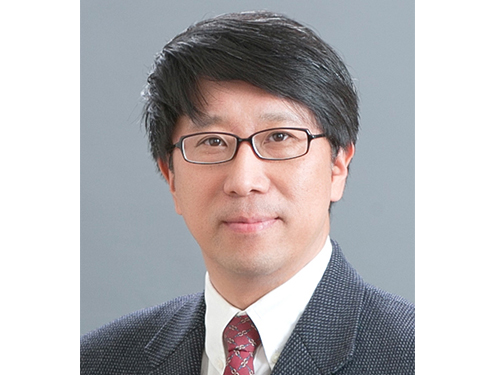 Professor Dongman Lee Wins the 2016 Korea Internet Award
Professor Dongman Lee of KAIST’s School of Computing received the 11th Korea Internet Award in the category of personal achievement on December 13 at the Creative Economy and Innovation Center in Gyeonggi province.
Hosted by the Ministry of Science, ICT and Future Planning of Korea, the Internet Award recognizes leaders in the Internet industry and their contributions.
Since 2010, Professor Lee has conducted research on the Internet of Things (IoT) platforms, resulting in the publication of five research papers in Science Citation Index (SCI) journals, ten papers in Korean journals, 30 best papers nominations at international conferences, and the registration of eleven patents. He has also worked on the creation of an IoT ecosystem through his research on object interworking platforms that can provide diverse user-customized services in the IoT environment.
His research team built a test bed for applicable IoT platforms on the 8th floor of the IT Convergence Center on campus to implement experiments and collect various data, thereby creating a foundation to carry out research projects in this field.
Professor Lee has helped the advancement of an Internet governance system in Korea by researching Internet governance policies, holding important posts in related academic societies including the Chairman of the Korea Internet Governance Alliance (KIGA) Council, and hosting major conferences such as the Asia Pacific Regional Internet Governance Forum (APrIGF).
2016.12.20 View 9019
Professor Dongman Lee Wins the 2016 Korea Internet Award
Professor Dongman Lee of KAIST’s School of Computing received the 11th Korea Internet Award in the category of personal achievement on December 13 at the Creative Economy and Innovation Center in Gyeonggi province.
Hosted by the Ministry of Science, ICT and Future Planning of Korea, the Internet Award recognizes leaders in the Internet industry and their contributions.
Since 2010, Professor Lee has conducted research on the Internet of Things (IoT) platforms, resulting in the publication of five research papers in Science Citation Index (SCI) journals, ten papers in Korean journals, 30 best papers nominations at international conferences, and the registration of eleven patents. He has also worked on the creation of an IoT ecosystem through his research on object interworking platforms that can provide diverse user-customized services in the IoT environment.
His research team built a test bed for applicable IoT platforms on the 8th floor of the IT Convergence Center on campus to implement experiments and collect various data, thereby creating a foundation to carry out research projects in this field.
Professor Lee has helped the advancement of an Internet governance system in Korea by researching Internet governance policies, holding important posts in related academic societies including the Chairman of the Korea Internet Governance Alliance (KIGA) Council, and hosting major conferences such as the Asia Pacific Regional Internet Governance Forum (APrIGF).
2016.12.20 View 9019 -
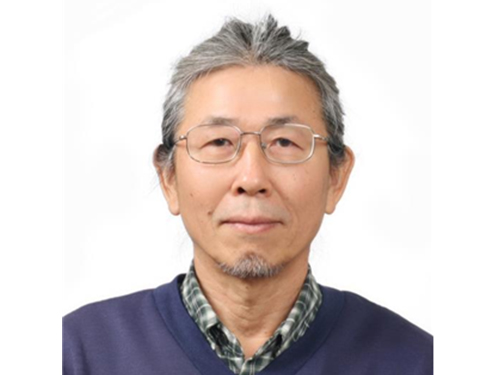 Professor Suck-Joo Na Receives the 2016 Humboldt Research Award
The Alexander von Humboldt Foundation, established by the German government in 1953, promotes academic cooperation and exchange among scientists and scholars from Germany and abroad. The foundation has bestowed this year's award to Professor Suck-Joo Na of KAIST's Mechanical Engineering Department in recognition of his lifetime achievements.
Professor Na's main interests are in the fields of arc and laser welding, computational fluid dynamics simulation, residual stress and distortion, and design of welded structures. He has received numerous honors and awards including the Research Fellowship Award from the Alexander von Humboldt Foundation (1989), the Excellent Research Paper Award from the Korean Welding and Joining Society (1993), the Charles H. Jennings Memorial Award from the American Welding Society (2003), and the Yoshiaki Arata Award from the International Institute of Welding (2014).
The Humboldt Research Award is granted annually to up to 100 academics whose fundamental discoveries, new theories, or insights have had a significant impact on their own discipline and who are expected to continue producing cutting-edge achievements in the future.
The award winners also receive a research grant of 60,000 Euros and are invited to work up to one year with colleagues at research institutions in Germany. Nominations for the award are made only by established academic institutions in Germany.
Professor Na will collaborate with a research team led by Professor Michael Rethmeier at the Berlin-based Federal Institute for Materials Research and Testing (BAM) to conduct research in laser welding and selective laser melting, as well as the mathematical analysis of these manufacturing processes from July 2017 to the end of February 2018.
2016.12.19 View 8096
Professor Suck-Joo Na Receives the 2016 Humboldt Research Award
The Alexander von Humboldt Foundation, established by the German government in 1953, promotes academic cooperation and exchange among scientists and scholars from Germany and abroad. The foundation has bestowed this year's award to Professor Suck-Joo Na of KAIST's Mechanical Engineering Department in recognition of his lifetime achievements.
Professor Na's main interests are in the fields of arc and laser welding, computational fluid dynamics simulation, residual stress and distortion, and design of welded structures. He has received numerous honors and awards including the Research Fellowship Award from the Alexander von Humboldt Foundation (1989), the Excellent Research Paper Award from the Korean Welding and Joining Society (1993), the Charles H. Jennings Memorial Award from the American Welding Society (2003), and the Yoshiaki Arata Award from the International Institute of Welding (2014).
The Humboldt Research Award is granted annually to up to 100 academics whose fundamental discoveries, new theories, or insights have had a significant impact on their own discipline and who are expected to continue producing cutting-edge achievements in the future.
The award winners also receive a research grant of 60,000 Euros and are invited to work up to one year with colleagues at research institutions in Germany. Nominations for the award are made only by established academic institutions in Germany.
Professor Na will collaborate with a research team led by Professor Michael Rethmeier at the Berlin-based Federal Institute for Materials Research and Testing (BAM) to conduct research in laser welding and selective laser melting, as well as the mathematical analysis of these manufacturing processes from July 2017 to the end of February 2018.
2016.12.19 View 8096 -
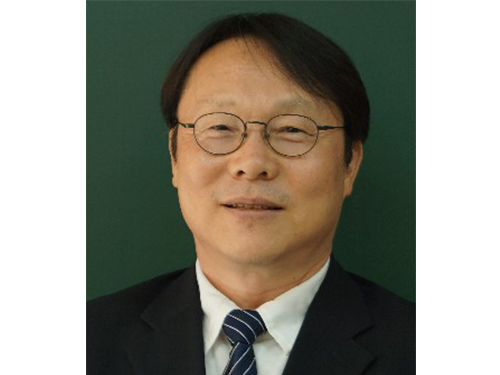 Professor Ih Reappointed as Vice President of the ICA
Professor Jeong-Guon Ih of the Mechanical Engineering Department at KAIST has been re-elected as the Vice President of the International Commission for Acoustics (ICA). His second term of office is from October 16, 2016 to September 30, 2019.
Professor Ih, the first Korean who was selected to a senior position on the ICA management board, took over his current post in 2015 when the vice president at the time passed away in the middle of his term.
During his stint, Professor Ih played a key role in planning the ICA’s triennial gathering, the International Congress on Acoustics, in Gyeongju, Korea, scheduled for October 24-28, 2022. He will also serve as the general chair for the conference.
The International Congress on Acoustics is the largest professional meeting in the field of acoustics. It provides a venue to meet, discuss, and exchange ideas covering all aspects of acoustics including an extensive technical exhibition that highlights the latest advances in acoustical products such as materials, systems, and equipment.
Acoustics has grown to become an important element in the Information Age in the areas of automation, machine learning, and virtual reality. Hosting the Congress will support Korea’s goal to lead acoustic research and development on the global stage.
Professor Ih said, “Serving international academic organizations offers great opportunities to learn global trends and to collaborate with various research institutions, universities, and industries worldwide. I hope my service will inspire many young Korean researchers to pursue their careers in this field.”
Professor Ih is also a member of eight eminent international academic societies such as the Audio Engineering Society, the International Congress on Ultrasonics, and the International Institute of Noise Control Engineering.
The ICA was founded in 1951 as a subcommittee of the International Union of Pure and Applied Physics (IUPAP), and it consists of 46 member states and four observer nations. It promotes international development and collaboration in all fields of acoustics including research, development, education, and standardization.
2016.12.16 View 7763
Professor Ih Reappointed as Vice President of the ICA
Professor Jeong-Guon Ih of the Mechanical Engineering Department at KAIST has been re-elected as the Vice President of the International Commission for Acoustics (ICA). His second term of office is from October 16, 2016 to September 30, 2019.
Professor Ih, the first Korean who was selected to a senior position on the ICA management board, took over his current post in 2015 when the vice president at the time passed away in the middle of his term.
During his stint, Professor Ih played a key role in planning the ICA’s triennial gathering, the International Congress on Acoustics, in Gyeongju, Korea, scheduled for October 24-28, 2022. He will also serve as the general chair for the conference.
The International Congress on Acoustics is the largest professional meeting in the field of acoustics. It provides a venue to meet, discuss, and exchange ideas covering all aspects of acoustics including an extensive technical exhibition that highlights the latest advances in acoustical products such as materials, systems, and equipment.
Acoustics has grown to become an important element in the Information Age in the areas of automation, machine learning, and virtual reality. Hosting the Congress will support Korea’s goal to lead acoustic research and development on the global stage.
Professor Ih said, “Serving international academic organizations offers great opportunities to learn global trends and to collaborate with various research institutions, universities, and industries worldwide. I hope my service will inspire many young Korean researchers to pursue their careers in this field.”
Professor Ih is also a member of eight eminent international academic societies such as the Audio Engineering Society, the International Congress on Ultrasonics, and the International Institute of Noise Control Engineering.
The ICA was founded in 1951 as a subcommittee of the International Union of Pure and Applied Physics (IUPAP), and it consists of 46 member states and four observer nations. It promotes international development and collaboration in all fields of acoustics including research, development, education, and standardization.
2016.12.16 View 7763 -
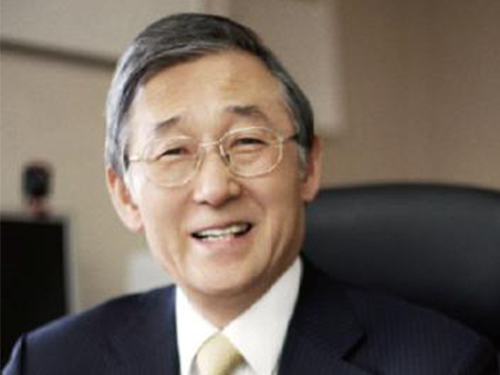 KAIST's Board of Trustees Reappoints Dr. Jang-Moo Lee as Chairman
Dr. Jang-Moo Lee, the incumbent Chairman of the KAIST Board of Trustees, has been re-elected to head the office. His term will begin from the date of approval by the Minister of Science, ICT and Future Planning of Korea and will last for three years.
Dr. Lee received his undergraduate and master’s degrees in mechanical engineering from Seoul National University. He later earned his doctoral degree in mechanical engineering from Iowa State University in the United States.
Joined the faculty of his alma mater in 1976, Dr. Lee held various posts within the university including the dean of the engineering college. He served as the president of the Association of Korean Engineering Colleges, the founding chairman of the Korea Evaluation Institute of Industrial Technology, the president of the Korean Society of Mechanical Engineers, the 24th president of Seoul National University, and the 13th president of the Korean Council for University Education. He now serves as the president of the National Science and Technology Council of Korea and the chairman of Climate Change Center’s Board of Directors.
Dr. Lee has received numerous honors and awards, among others, the Academic Award of the Korean Society of Mechanical Engineers (1985), the Order of Science and Technology Merit from the Korean government (2005), the National Academy of Sciences Award (2005), and the Order of Service Merit in Blue Stripes (2010) from the Korean government. He was also selected as the Alma Mater Proud from Kyunggi High School in 2011.
2016.12.15 View 4402
KAIST's Board of Trustees Reappoints Dr. Jang-Moo Lee as Chairman
Dr. Jang-Moo Lee, the incumbent Chairman of the KAIST Board of Trustees, has been re-elected to head the office. His term will begin from the date of approval by the Minister of Science, ICT and Future Planning of Korea and will last for three years.
Dr. Lee received his undergraduate and master’s degrees in mechanical engineering from Seoul National University. He later earned his doctoral degree in mechanical engineering from Iowa State University in the United States.
Joined the faculty of his alma mater in 1976, Dr. Lee held various posts within the university including the dean of the engineering college. He served as the president of the Association of Korean Engineering Colleges, the founding chairman of the Korea Evaluation Institute of Industrial Technology, the president of the Korean Society of Mechanical Engineers, the 24th president of Seoul National University, and the 13th president of the Korean Council for University Education. He now serves as the president of the National Science and Technology Council of Korea and the chairman of Climate Change Center’s Board of Directors.
Dr. Lee has received numerous honors and awards, among others, the Academic Award of the Korean Society of Mechanical Engineers (1985), the Order of Science and Technology Merit from the Korean government (2005), the National Academy of Sciences Award (2005), and the Order of Service Merit in Blue Stripes (2010) from the Korean government. He was also selected as the Alma Mater Proud from Kyunggi High School in 2011.
2016.12.15 View 4402 -
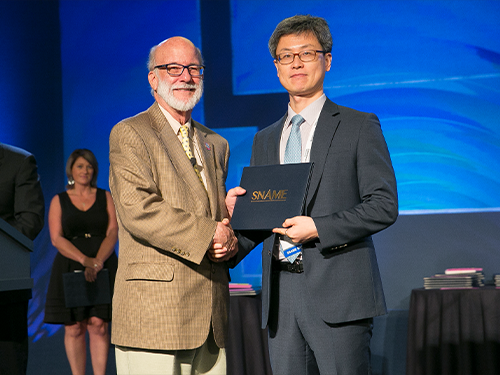 Professor Hyun Chung Claims the Elmer L. Hann Award 2016
Professor Hyun Chung of KAIST’s Mechanical Engineering Department received the Elmer L. Hann Award 2016 at the SNAME Maritime Convention (SMC) that took place November 1-5 in Seattle, Washington, in the United States.
Held annually, the SMC is the largest academic gathering for researchers and professionals in maritime and ocean engineering, and it is hosted by the Society of Naval Architects and Marine Engineers (SNAME).
With more than 6,000 members around the world in 85 countries, SNAME is an internationally-recognized, non-profit, professional society of individual members serving the maritime and offshore industries and their suppliers. It strives to advance the art, science, and practice of naval architecture, marine engineering, ocean engineering, and other marine-related professions through the exchange of knowledge and ideas, as well as the promotion of R&D, and education.
Every year, SNAME selects three research papers that are either published in its academic journal or presented at its sponsored conferences and awards them, respectively. One of the three awards is the Elmer L. Hann Award.
This year, the Society announced Professor Chung’s paper as the Elmer L. Hann Award winner. His paper, entitled “Tolerance Analysis and Diagnosis Model of Compliant Block Assembly Considering Welding Deformation,” was presented at the World Maritime Technology Conference held November 3-7, 2015 in Providence, Rhode Island, USA.
Analysis, management, and diagnostics of tolerance are important factors in the production of ocean structures. In the paper, Professor Chung’s team proposed a simplified tolerance analysis and diagnosis model including the effects of welding distortion for accuracy control in ship block assembly, thereby improving the production process.
Professor Chung said, “This is indeed a wonderful award for our team. From early this year, with support from the U.S. Office of Naval Research, we have collaborated with the University of Michigan, the Massachusetts Institute of Technology, Ohio State University, and the Edison Welding Institute to study this topic more deeply. We will keep up the good work to make meaningful progress.”
2016.12.10 View 8736
Professor Hyun Chung Claims the Elmer L. Hann Award 2016
Professor Hyun Chung of KAIST’s Mechanical Engineering Department received the Elmer L. Hann Award 2016 at the SNAME Maritime Convention (SMC) that took place November 1-5 in Seattle, Washington, in the United States.
Held annually, the SMC is the largest academic gathering for researchers and professionals in maritime and ocean engineering, and it is hosted by the Society of Naval Architects and Marine Engineers (SNAME).
With more than 6,000 members around the world in 85 countries, SNAME is an internationally-recognized, non-profit, professional society of individual members serving the maritime and offshore industries and their suppliers. It strives to advance the art, science, and practice of naval architecture, marine engineering, ocean engineering, and other marine-related professions through the exchange of knowledge and ideas, as well as the promotion of R&D, and education.
Every year, SNAME selects three research papers that are either published in its academic journal or presented at its sponsored conferences and awards them, respectively. One of the three awards is the Elmer L. Hann Award.
This year, the Society announced Professor Chung’s paper as the Elmer L. Hann Award winner. His paper, entitled “Tolerance Analysis and Diagnosis Model of Compliant Block Assembly Considering Welding Deformation,” was presented at the World Maritime Technology Conference held November 3-7, 2015 in Providence, Rhode Island, USA.
Analysis, management, and diagnostics of tolerance are important factors in the production of ocean structures. In the paper, Professor Chung’s team proposed a simplified tolerance analysis and diagnosis model including the effects of welding distortion for accuracy control in ship block assembly, thereby improving the production process.
Professor Chung said, “This is indeed a wonderful award for our team. From early this year, with support from the U.S. Office of Naval Research, we have collaborated with the University of Michigan, the Massachusetts Institute of Technology, Ohio State University, and the Edison Welding Institute to study this topic more deeply. We will keep up the good work to make meaningful progress.”
2016.12.10 View 8736 -
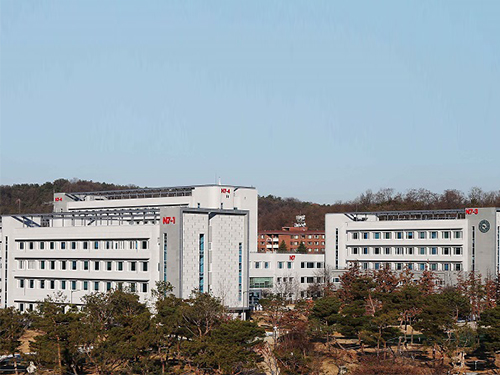 Mechanical Engineering Building on Campus Refurbished
KAIST’s Mechanical Engineering Department has finished the project to remodel its buildings and hosted an opening ceremony on December 12, 2016, which was attended by the university’s senior management and guests including President Steve Kang and Choong-Hwan Ahn, Architecture Policy Officer at the Ministry of Land, Infrastructure and Transport of Korea (MLIT).
With an investment of approximately USD 10 million, the old buildings (each consisting of seven floors and one basement) were transformed into smart, green buildings. Among the upgrades were the establishment of LED lighting systems, the replacement of the exterior walls with insulated materials, and the installation of double-glazed windows, all resulting in the improvement of the buildings’ energy efficiency. Previously, offices and lecture halls in the buildings had individual cooling and heating systems, which consumed a great deal of energy, but they were replaced with a centralized smart energy control system that monitors the operation status as well as energy consumption in real time.
With these new improvements, the Department was able to slash its energy consumption by 32%, for which it received Green Building Conversion Certification from MLIT. The ministry issues the certification to buildings that reduce their energy consumption by over 20% as a result of infrastructure upgrades. Beginning with the Mechanical Engineering buildings, KAIST will work on obtaining this certification for all of its buildings that are either under renovation or construction.
President Kang said, “We are pleased to offer our students a comfortable environment for study and research and will continue improving outdated facilities and infrastructure to make the campus safer and nicer.”
Picture 1: Ribbon-cutting ceremony for the refurbished Mechanical Engineering buildings on campus
Picture 2: Mechanical engineering buildings
2016.12.09 View 7739
Mechanical Engineering Building on Campus Refurbished
KAIST’s Mechanical Engineering Department has finished the project to remodel its buildings and hosted an opening ceremony on December 12, 2016, which was attended by the university’s senior management and guests including President Steve Kang and Choong-Hwan Ahn, Architecture Policy Officer at the Ministry of Land, Infrastructure and Transport of Korea (MLIT).
With an investment of approximately USD 10 million, the old buildings (each consisting of seven floors and one basement) were transformed into smart, green buildings. Among the upgrades were the establishment of LED lighting systems, the replacement of the exterior walls with insulated materials, and the installation of double-glazed windows, all resulting in the improvement of the buildings’ energy efficiency. Previously, offices and lecture halls in the buildings had individual cooling and heating systems, which consumed a great deal of energy, but they were replaced with a centralized smart energy control system that monitors the operation status as well as energy consumption in real time.
With these new improvements, the Department was able to slash its energy consumption by 32%, for which it received Green Building Conversion Certification from MLIT. The ministry issues the certification to buildings that reduce their energy consumption by over 20% as a result of infrastructure upgrades. Beginning with the Mechanical Engineering buildings, KAIST will work on obtaining this certification for all of its buildings that are either under renovation or construction.
President Kang said, “We are pleased to offer our students a comfortable environment for study and research and will continue improving outdated facilities and infrastructure to make the campus safer and nicer.”
Picture 1: Ribbon-cutting ceremony for the refurbished Mechanical Engineering buildings on campus
Picture 2: Mechanical engineering buildings
2016.12.09 View 7739 -
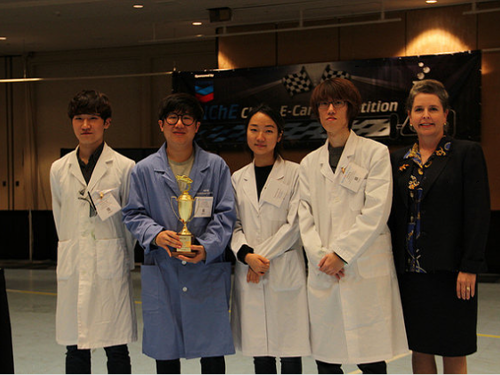 A KAIST Team Wins the Chem-E-Car Competition 2016
A KAIST team consisted of four students from the Department of Chemical and Biomolecular Engineering won the Chem-E-Car Competition 2016, which took place on November 13 at the Union Square in San Francisco. The students who participated were Young-Hyun Cha, Jin-Sol Shin, Dae-Seok Oh, and Wan-Tae Kim. Their adviser was Professor Doh Chang Lee of the same department.
Established in 1999, the Chem-E-Car is an annual worldwide college competition for students majoring in chemical engineering. The American Institute of Chemical Engineers (AIChE), founded in 1908, is the world’s leading organization for chemical engineering professionals with more than 50,000 members from over 100 countries and hosts this competition every year.
A total of 41 university teams including Carnegie Mellon University and Purdue University participated in this year’s competition.
KAIST students competed in the event for the first time in 2014 and reached the rank of 28. In 2015, the students placed 16th, and finally, took the first place in last month’s competition, followed by the Georgia Institute of Technology.
In the competition, students must design small-scale (20x30x40 cm) automobiles that operate chemically, as well as describe their research and drive their car a fixed distance down a wedge-shaped course to demonstrate the car’s capabilities. In addition to driving a specified distance (15-30 meters), the car must hold a payload of 0-500 mL of water.
The organizers tell participants the exact distance and amount of payloads one hour before the competition begins. Winners are chosen based on their finishing time and how close their car reaches the finish line. Thus, students must show sophisticated coordination of chemical reactions to win.
The KAIST team designed their car to have a stable power output using a Vanadium redox flow battery developed by Professor Hee Tak Kim of Chemical and Biomolecular Engineering. They employed iodine clock reactions to induce quick and precise chemical reactions to control their car.
KAIST’s car finished with the best run coming within 11 cm of the target line; Georgia Tech’s car reached the finish line by 13 cm and New Jersey Institute of Technology’s car by 14 cm.
Young-Hyun Cha, one of the four students, said, “When we first designed our car, we had to deal with many issues such as stalls or connection errors. We kept working on fixing these problems through trial and error, which eventually led us to success.”
For a news article on KAIST’s win at 2016 Chemi-E-Car Competition by AIChE, see the link below:
http://www.aiche.org/chenected/2016/11/koreas-kaist-wins-1st-place-2016-chem-e-car-competition-photos
2016.12.08 View 11413
A KAIST Team Wins the Chem-E-Car Competition 2016
A KAIST team consisted of four students from the Department of Chemical and Biomolecular Engineering won the Chem-E-Car Competition 2016, which took place on November 13 at the Union Square in San Francisco. The students who participated were Young-Hyun Cha, Jin-Sol Shin, Dae-Seok Oh, and Wan-Tae Kim. Their adviser was Professor Doh Chang Lee of the same department.
Established in 1999, the Chem-E-Car is an annual worldwide college competition for students majoring in chemical engineering. The American Institute of Chemical Engineers (AIChE), founded in 1908, is the world’s leading organization for chemical engineering professionals with more than 50,000 members from over 100 countries and hosts this competition every year.
A total of 41 university teams including Carnegie Mellon University and Purdue University participated in this year’s competition.
KAIST students competed in the event for the first time in 2014 and reached the rank of 28. In 2015, the students placed 16th, and finally, took the first place in last month’s competition, followed by the Georgia Institute of Technology.
In the competition, students must design small-scale (20x30x40 cm) automobiles that operate chemically, as well as describe their research and drive their car a fixed distance down a wedge-shaped course to demonstrate the car’s capabilities. In addition to driving a specified distance (15-30 meters), the car must hold a payload of 0-500 mL of water.
The organizers tell participants the exact distance and amount of payloads one hour before the competition begins. Winners are chosen based on their finishing time and how close their car reaches the finish line. Thus, students must show sophisticated coordination of chemical reactions to win.
The KAIST team designed their car to have a stable power output using a Vanadium redox flow battery developed by Professor Hee Tak Kim of Chemical and Biomolecular Engineering. They employed iodine clock reactions to induce quick and precise chemical reactions to control their car.
KAIST’s car finished with the best run coming within 11 cm of the target line; Georgia Tech’s car reached the finish line by 13 cm and New Jersey Institute of Technology’s car by 14 cm.
Young-Hyun Cha, one of the four students, said, “When we first designed our car, we had to deal with many issues such as stalls or connection errors. We kept working on fixing these problems through trial and error, which eventually led us to success.”
For a news article on KAIST’s win at 2016 Chemi-E-Car Competition by AIChE, see the link below:
http://www.aiche.org/chenected/2016/11/koreas-kaist-wins-1st-place-2016-chem-e-car-competition-photos
2016.12.08 View 11413 -
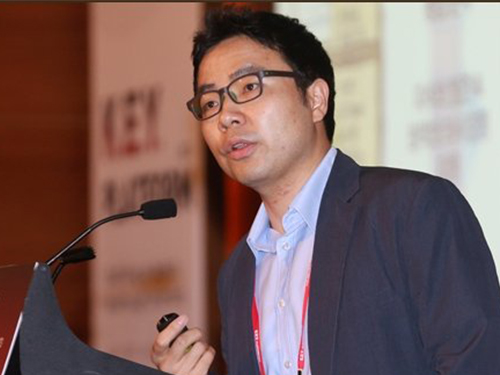 Professor Young Jae Jang Receives the Grant Award from Mathworks
Professor Young Jae Jang of KAIST’s Industrial and Systems Engineering Department won the Grant Award from Mathworks, Inc., an American developer of mathematical computing software. Headquartered in Massachusetts in the United States, Mathworks has been known for its MATLAB software that is used by many engineers and scientists around the world for algorithm development, data analysis, visualization, and numeric computation.
Winners of the Grant Award are selected from proposals submitted by educational institutions in 18 different countries based on their innovative lab curricula and future potential for innovation and creativity.
Award winners receive a cash grant of up to USD 40,000 as well as various other forms of support including software and technical guidance for creating a course.
Professor Jang has researched combining the concept of industrial engineering education with Lego principles since 2014. He developed Lego-based experimental equipment and utilized it to teach students about difficult ideas, for example, big data and manufacturing technologies needed for Industry 4.0, such as automation, cyber-physical systems, the Internet of Things, and cloud computing. He created an innovative teaching environment where students learn engineering concepts and then conduct experiments on their own to understand the new paradigm of industrial systems.
Lego-based education allows students to personalize their learning process, shifting lecture-centered approaches toward learner-oriented approaches. Students apply theories to operate tools and equipment made with Lego, identify problems, and find solutions. In such processes, they can understand the content of their study more easily and efficiently and become more motivated.
Professor Jang’s research has attracted a great deal of interest overseas, and he is frequently invited to international conferences as a keynote speaker.
Picture: Lego-based Learning Model of Experiment Equipment Developed by Professor Young Jae Jang
2016.12.08 View 6831
Professor Young Jae Jang Receives the Grant Award from Mathworks
Professor Young Jae Jang of KAIST’s Industrial and Systems Engineering Department won the Grant Award from Mathworks, Inc., an American developer of mathematical computing software. Headquartered in Massachusetts in the United States, Mathworks has been known for its MATLAB software that is used by many engineers and scientists around the world for algorithm development, data analysis, visualization, and numeric computation.
Winners of the Grant Award are selected from proposals submitted by educational institutions in 18 different countries based on their innovative lab curricula and future potential for innovation and creativity.
Award winners receive a cash grant of up to USD 40,000 as well as various other forms of support including software and technical guidance for creating a course.
Professor Jang has researched combining the concept of industrial engineering education with Lego principles since 2014. He developed Lego-based experimental equipment and utilized it to teach students about difficult ideas, for example, big data and manufacturing technologies needed for Industry 4.0, such as automation, cyber-physical systems, the Internet of Things, and cloud computing. He created an innovative teaching environment where students learn engineering concepts and then conduct experiments on their own to understand the new paradigm of industrial systems.
Lego-based education allows students to personalize their learning process, shifting lecture-centered approaches toward learner-oriented approaches. Students apply theories to operate tools and equipment made with Lego, identify problems, and find solutions. In such processes, they can understand the content of their study more easily and efficiently and become more motivated.
Professor Jang’s research has attracted a great deal of interest overseas, and he is frequently invited to international conferences as a keynote speaker.
Picture: Lego-based Learning Model of Experiment Equipment Developed by Professor Young Jae Jang
2016.12.08 View 6831 -
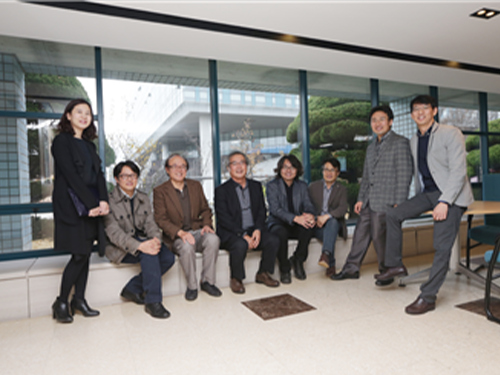 Mobile Software Platform Research Center Recognized by the MSIP
The Mobile Software Platform Research Center (MSPRC) at KAIST received an award from the Minister of Science, ICT and Future Planning of Korea on November 29, 2016, at Coex in Seoul. The award was presented at the Conference of Software R&D Annual Report 2016 hosted by the Ministry of Science, ICT and Future Planning (MISP) and the Institute for Information and Communications Technology Promotion (IITP).
The research center developed user experience (UX)-oriented mobile software platforms that support the invention of next-generation UX service technologies. The center has filed 37 patents and registered 15 technologies. Its researchers received ten Best Paper Awards and published a total of 133 papers in Korean and international journals.
Research teams at MSPRC expect that their software platforms will offer training programs for software engineers and new UX services. They also said that their extensive event processing platforms would reduce energy consumption on mobile devices.
Professor Seungryoul Maeng of the School of Computing, the Director of MSPRC, said, “This is a great honor for us. I am greatly thankful for the teamwork of participating departments--Computer Science, Industrial Design, and Industrial and Systems Engineering. We will continue to introduce our research outcomes and to work towards commercializing these results.”
Members of the Mobile Software Platform Research Center, KAIST
2016.12.07 View 7709
Mobile Software Platform Research Center Recognized by the MSIP
The Mobile Software Platform Research Center (MSPRC) at KAIST received an award from the Minister of Science, ICT and Future Planning of Korea on November 29, 2016, at Coex in Seoul. The award was presented at the Conference of Software R&D Annual Report 2016 hosted by the Ministry of Science, ICT and Future Planning (MISP) and the Institute for Information and Communications Technology Promotion (IITP).
The research center developed user experience (UX)-oriented mobile software platforms that support the invention of next-generation UX service technologies. The center has filed 37 patents and registered 15 technologies. Its researchers received ten Best Paper Awards and published a total of 133 papers in Korean and international journals.
Research teams at MSPRC expect that their software platforms will offer training programs for software engineers and new UX services. They also said that their extensive event processing platforms would reduce energy consumption on mobile devices.
Professor Seungryoul Maeng of the School of Computing, the Director of MSPRC, said, “This is a great honor for us. I am greatly thankful for the teamwork of participating departments--Computer Science, Industrial Design, and Industrial and Systems Engineering. We will continue to introduce our research outcomes and to work towards commercializing these results.”
Members of the Mobile Software Platform Research Center, KAIST
2016.12.07 View 7709 -
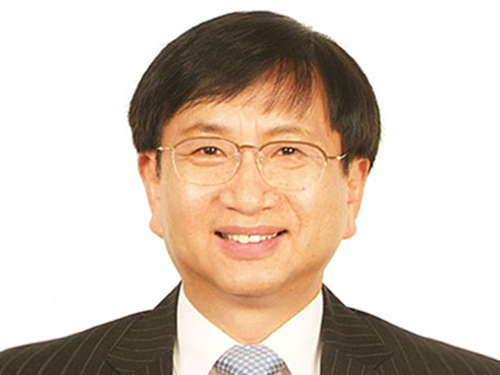 Professor Kwon to Represent the Asia-Pacific Region of the IEEE RAS
Professor Dong-Soon Kwon of the Mechanical Engineering Department at KAIST has been reappointed to the Administrative Committee of the Institute of Electrical and Electronics Engineers (IEEE) Robotics and Automation Society (IEEE RAS). Beginning January 1, 2017, he will serve his second three-year term, which will end in 2019. In 2014, he was the first Korean appointed to the committee, representing the Asia-Pacific community of the IEEE Society.
Professor Kwon said, “I feel thankful but, at the same time, it is a great responsibility to serve the Asian research community within the Society. I hope I can contribute to the development of robotics engineering in the region and in Korea as well.”
Consisted of 18 elected members, the administrative committee manages the major activities of IEEE RAS including hosting its annual flagship meeting, the International Conference on Robotics and Automation.
The IEEE RAS fosters the advancement in the theory and practice of robotics and automation engineering and facilitates the exchange of scientific and technological knowledge that supports the maintenance of high professional standards among its members.
2016.12.06 View 10568
Professor Kwon to Represent the Asia-Pacific Region of the IEEE RAS
Professor Dong-Soon Kwon of the Mechanical Engineering Department at KAIST has been reappointed to the Administrative Committee of the Institute of Electrical and Electronics Engineers (IEEE) Robotics and Automation Society (IEEE RAS). Beginning January 1, 2017, he will serve his second three-year term, which will end in 2019. In 2014, he was the first Korean appointed to the committee, representing the Asia-Pacific community of the IEEE Society.
Professor Kwon said, “I feel thankful but, at the same time, it is a great responsibility to serve the Asian research community within the Society. I hope I can contribute to the development of robotics engineering in the region and in Korea as well.”
Consisted of 18 elected members, the administrative committee manages the major activities of IEEE RAS including hosting its annual flagship meeting, the International Conference on Robotics and Automation.
The IEEE RAS fosters the advancement in the theory and practice of robotics and automation engineering and facilitates the exchange of scientific and technological knowledge that supports the maintenance of high professional standards among its members.
2016.12.06 View 10568 -
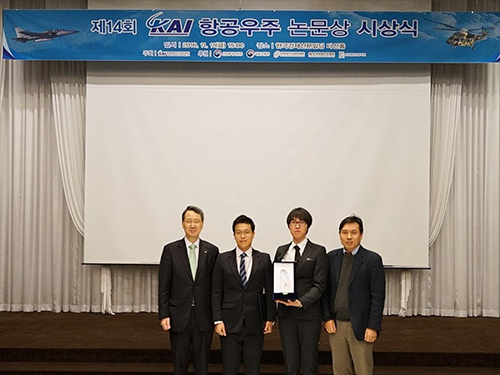 Aerospace Engineering Students Win the Minister's Award
On November 11, 2016, students from KAIST’s Aerospace Engineering Department won the Minister’s Award of Trade, Industry and Energy of Korea at the 14th Research Paper Competition hosted by Korea Aerospace Industries (KAI). The award came with a cash prize of USD 1,200 as well as opportunities to visit international airshows held abroad.
The KAIST students' paper introduced a novel design concept for "a virtual-fighter-pilot system for unmanned combat aerial vehicles to enable them to engage in mass aerial combat."
This was one of the two highest honors given to contestants. A group of students from Korea Aerospace University received the other grand prize from the Minister of Land, Infrastructure and Transport of Korea.
The KAIST team consisted of two doctoral students, Hee-Min Shin and Jae-Hyun Lee, and one Master’s student, Hyun-Gi Kim. Their advisor, Professor “David” Hyunchul Shim, received the Special Achievement Award for his contribution to the paper.
KAI’s competition was established in 2003 to spur academic interest and research in aerospace engineering. Over the past 14 years, contestants have submitted 376 papers, and KAI has published 88 papers. KAI has positioned itself as the host of one of the most prestigious research paper competitions held in Korea in the area of aerospace engineering.
The Korean Society for Aeronautical and Space Sciences, the Korea Aerospace Industries Association, and the Korea Civil Aviation Development Association also sponsored the competition, with the Ministries of Trade, Industry and Energy and of Land, Infrastructure and Transport.
Professor Shim said, “This represents a great honor for our students. In recent years, research in unmanned aerial systems has increased tremendously throughout the world, and I hope KAIST will continue to inspire and innovate research in this field.”
Pictured from left to right are Hee-Min Shin, Jae-Hyun Lee, and Hyun-Gi Kim.
Pictured from right to left are Professor Hyunchul Shim, Hyun-Gi Kim, Hee-Min Shin, and Vice President Sung-Sup Chang of Korea Aerospace Industries.
2016.11.22 View 12447
Aerospace Engineering Students Win the Minister's Award
On November 11, 2016, students from KAIST’s Aerospace Engineering Department won the Minister’s Award of Trade, Industry and Energy of Korea at the 14th Research Paper Competition hosted by Korea Aerospace Industries (KAI). The award came with a cash prize of USD 1,200 as well as opportunities to visit international airshows held abroad.
The KAIST students' paper introduced a novel design concept for "a virtual-fighter-pilot system for unmanned combat aerial vehicles to enable them to engage in mass aerial combat."
This was one of the two highest honors given to contestants. A group of students from Korea Aerospace University received the other grand prize from the Minister of Land, Infrastructure and Transport of Korea.
The KAIST team consisted of two doctoral students, Hee-Min Shin and Jae-Hyun Lee, and one Master’s student, Hyun-Gi Kim. Their advisor, Professor “David” Hyunchul Shim, received the Special Achievement Award for his contribution to the paper.
KAI’s competition was established in 2003 to spur academic interest and research in aerospace engineering. Over the past 14 years, contestants have submitted 376 papers, and KAI has published 88 papers. KAI has positioned itself as the host of one of the most prestigious research paper competitions held in Korea in the area of aerospace engineering.
The Korean Society for Aeronautical and Space Sciences, the Korea Aerospace Industries Association, and the Korea Civil Aviation Development Association also sponsored the competition, with the Ministries of Trade, Industry and Energy and of Land, Infrastructure and Transport.
Professor Shim said, “This represents a great honor for our students. In recent years, research in unmanned aerial systems has increased tremendously throughout the world, and I hope KAIST will continue to inspire and innovate research in this field.”
Pictured from left to right are Hee-Min Shin, Jae-Hyun Lee, and Hyun-Gi Kim.
Pictured from right to left are Professor Hyunchul Shim, Hyun-Gi Kim, Hee-Min Shin, and Vice President Sung-Sup Chang of Korea Aerospace Industries.
2016.11.22 View 12447